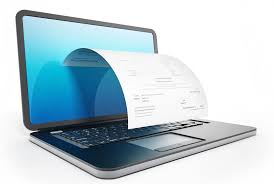What is an electronic invoice?
The electronic invoice is the equivalent of a paper invoice, but the difference is that it has been issued in digital format. It means that this document reflects information on a sale or purchase of goods or services issued and received by electronic means. It is used to give fiscal and legal validity to the transaction.
Why is there so much talk now about electronic invoicing for the self-employed?
In recent years, a series of regulations have been passed that affect electronic invoicing for companies and the self-employed with the private sector. The most important of these are the ‘Crea y crece’ law and the anti-fraud law.
These regulations will force them to implement electronic invoicing in most cases and also to say goodbye to invoices in formats such as PDF or Excel. Invoices must be generated in a structured format to guarantee their authenticity and integrity, and must be sent in real time to the Inland Revenue via the Tax Agency’s Verifactu system. The self-employed in the Basque Country already use the Ticket BAI system, which works in a similar way to Verifactu.
Is electronic invoicing already mandatory for the self-employed?
There are laws that indicate this, but the self-employed are not yet obliged to issue electronic invoices and communicate them in real time to the tax authorities. This is because there are still regulations to be approved, such as the one that will establish the deadlines for the law that creates and grows. The Ministry of Economy is already putting the finishing touches to the regulation that will specify this information.
Once these regulations have been approved, the deadlines for adapting to electronic invoicing will be as follows: one year for self-employed workers with a turnover of more than eight million euros per year, and two years for those with a turnover of less than eight million euros. Nor should it be forgotten that the use of the Verifactu system, which is governed by another regulation that has already been approved, will be mandatory as of 1 July 2025.
Which self-employed will have to use electronic invoicing?
The law creates and grows will oblige all companies and freelancers to issue electronic invoices in their commercial relations with other companies and freelancers. Basically, any self-employed person or company must issue, send and receive electronic invoices in accordance with the law. However, it also entails some exceptions, unless the future regulation indicates otherwise.
Which self-employed could be exempted from using electronic invoicing?
Professionals who only work with end customers
When the new regulation is approved, one of the possible exceptions would be professionals and SMEs that only work with private customers.
However, these same professionals and companies will also have to use an electronic invoicing system in their relations with their suppliers. These suppliers will be obliged to use it to sell to companies and the self-employed. So, in the end, the vast majority of these businesses will also have to use electronic invoicing.
Freelancers working with foreign customers and suppliers
In contrast, as the law only applies to commercial relations in Spain, the self-employed and companies will not be obliged to use electronic invoicing for transactions with foreign customers or suppliers.
Self-employed persons invoicing the Administration and other sectors
Although electronic invoicing has been compulsory for years for transactions with the public sector, there are some exceptions. One of them is that of self-employed individuals, who are not obliged to do so. The law creates and grows does not affect them, as it only regulates commercial transactions in the private sector.
In practice, most of the self-employed who fall under these possible exceptions will have to use an e-invoicing system because their suppliers or customers will be obliged to do so.
